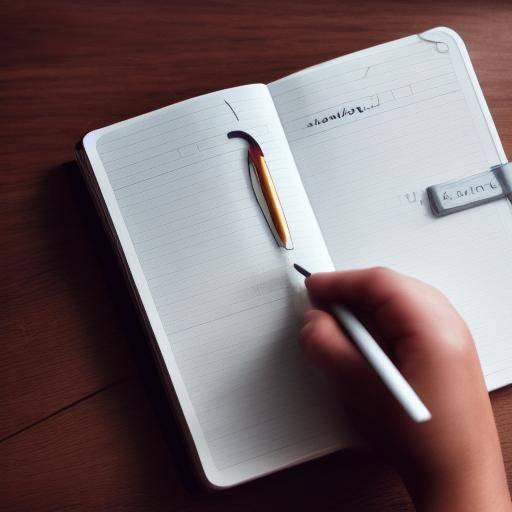
Journaling, or therapeutic writing, is a often underestimated technique that can have a profound impact on self-knowledge and personal development. This practice not only allows you to document your experiences and reflections, but can also be a powerful tool to explore your thoughts, emotions and goals. In this article, we will explore in depth how journaling can be used as an effective tool for self-knowledge and personal development. You will discover your benefits, challenges, practical advice, and everything you need to know to maximize your potential.
Introduction
Self-knowledge is a crucial skill that involves understanding your strengths, weaknesses, values, beliefs, and emotions. Through reflexive writing, you can deepen your inner life and understand your thinking and behavior patterns, which in turn allows you to better manage your emotions and make decisions more aligned with your values and goals. In this article, you will discover how journaling can be an invaluable tool to develop this type of self-knowledge.
History and Background
Journaling has a long history that goes back to ancient civilizations, where people used writing to document their experiences, thoughts and emotions. In the 1960s, therapeutic writing began to gain popularity as a form of self-exploitation and emotional healing. Since then, it has evolved to adapt to different approaches and rituals, including the popular "morning pages" technique promoted by Julia Cameron in her book "The Artist's Way". Over time, journaling has become a tool widely used in the field of personal development, psychotherapy, and coaching.
Analysis in Deep
The journaling offers many benefits, including reducing stress, clarifying thoughts and emotions, improving creativity, and tracking personal progress. For those seeking to develop self-knowledge, journaling provides a structured way of exploring and understanding the profound aspects of mind and heart. However, it is not without challenges, such as the discipline necessary to maintain a constant practice, or the internal resistance that may arise when confronting the uncomfortable truths about oneself.
Comprehensive review
The use of journaling for self-knowledge is based on providing a safe space to explore, question and understand your own experiences. The benefits of journaling in personal development are numerous, from increasing self-consciousness, to promoting self-reflection and cultivating full attention. By understanding your thinking and behavior patterns, you can identify areas of personal growth and set goals aligned with your fundamental values.
Comparative analysis
Although journaling focuses more on reflective writing, self-knowledge is a much wider process that encompasses self-exploration in its various forms, including meditation, therapy, coaching, and personal study. While these practices differ in their approaches and techniques, they share the common goal of promoting self-knowledge and personal growth. Understanding the differences between these practices can help you integrate them effectively on your journey to self-knowledge.
Practical Tips and Accessible Tips
By embarking on the journaling for self-knowledge, it is important to establish a space and time dedicated to writing. You can experience with different approaches, such as free writing, reflection focused on a specific theme, or the follow-up of a journal of gratitude. In addition, it is useful to set powerful questions that guide you in your internal exploration and encourage self-reflection.
Industry Perspectives and Expert Reviews
Experts in the field of personal development and psychology recognize the value of journaling as an effective tool for self-knowledge. Some even integrate it into coaching programs or therapy to help their customers achieve a deeper understanding of themselves. According to them, journaling can help in managing stress, strengthening emotional resilience, and fostering authenticity.
Case Studies and Practical Applications
Numerous studies have been conducted that support the positive effects of journaling on self-knowledge and personal development. For example, in a study published in the "Journal of Clinical Psychology", journaling was found to be effective in reducing stress and improving psychological well-being. In addition, many people have shared their personal experiences about how journaling has transformed their lives, helping them overcome emotional challenges, gain mental clarity, and make more conscious decisions.
Future Trends and Predictions
As awareness of emotional well-being and personal development continues to grow, journaling is expected to remain a popular tool for self-knowledge. With advances in technology, such as digital writing applications and online platforms, journaling practice is adapting to modern needs. Furthermore, the continuing emphasis on the balance between working and personal life is increasing awareness of the importance of self-knowledge for integral well-being.
Conclusions
Journaling is much more than just writing; it is a powerful practice that can transform the way you perceive yourself and the world around you. By providing a vehicle for self-exploration, journaling gives you the opportunity to deepen your inner being, understand your thinking and behavior patterns, and foster personal growth. By embarking on this day of self-knowledge through journaling, remember that constancy and patience are key. The fruits of your reflexive work will eventually lead you on a path of self-acceptance, authenticity and emotional well-being.
Frequently asked questions
How can I start with journaling practice?
Start by setting a daily time to write, either in the morning or at night. Find a quiet place where you can concentrate, and start with free reflections or writing on a topic that interests you. You can follow predefined structures, such as the "morning pages" method, or simply let your thoughts flow freely.
What are some topics I can explore during my journaling practice?
You can explore topics such as your personal values, your goals and dreams, your current challenges, your behavior patterns, your relationships, and your emotions. There are no limits as to what you can explore in your journal. The key is to allow you to be honest with yourself and be open to self-exploitation.
How long should I devote to journaling every day?
The time you devote to journaling may vary depending on your personal commitments and preferences. Some people find significant benefits by dedicating just 10-15 minutes a day, while others prefer more extensive sessions. The key is to establish a constant practice that suits your lifestyle.
Can I use digital media for journaling, or is writing better by hand?
Both handwriting and digital media have their own advantages. Handwriting can allow greater emotional connection, while digital media offer the convenience of search and organization. The choice depends on your personal preferences.
What should I do if I get stuck or I don't know what to write?
If you feel blocked, you can start by writing about your current mood, your concerns, or even about your creative blockade itself. You can also consider using powerful questions as a starting point for reflection. Remember that there are no "correct" answers in journaling; it is a self-discovery exercise and personal expression.
What are the benefits of journaling for self-knowledge?
The journaling offers a range of benefits, including greater self-consciousness, emotional management, mental clarity, creative development, stress reduction, and personal empowerment. In addition, it can provide a structured way of exploring and understanding the deepest layers of your being, which in turn can help you make decisions more aligned with your values and goals.
Is journaling suitable for everyone?
Journaling can be beneficial for most people, especially for those who seek to improve their self-knowledge and emotional well-being. However, if you have mental or emotional health concerns, it is important to seek professional guidance to determine whether journaling is suitable for you in your specific situation.
In short, journaling is a valuable tool for self-knowledge that can have a significant impact on your personal development. By providing a space to reflect, explore and understand your inner world, journaling allows you to deepen your being and cultivate a greater self-consciousness. With constant practice, patience and openness, journaling can become a powerful ally on your journey of self-discovery and personal growth.
Remember that self-knowledge is a continuous journey, and journaling can be your trusted travel companion in this search for understanding and authenticity.






















































